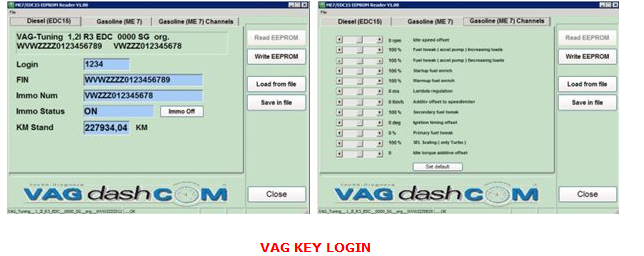Bosch Me7 Tuning Software

The definitive VR6 & R32 Remapping thread *****NOTE - LINKS MAY NEED YOU TO SIGN UP AND JOIN FORUMS DETAILED PLUS MAKE SOME POSTS TO SEE THE INFORMATION IN THE THREADS YOU ARE MISSING!****** Little bit of a “Bosch recalibration” thread for ya as I wasn't the op on the other one and have spent a while putting my notes into some legible format. About 90% of what I have done over the past half decade is predominantly ME7.1.1. Based, or, as a conservative estimate, around 5000+ hrs at least solely on the V6/R32 ecu's. As such, it is somewhat bias to that – however, the older Motronic don't have the central torque structure but are similar and I explain the evolutions!
Interpreting the Information on a Bosch Motronic ME7.x ECU. The cost of fully-functional versions of tuning software and, in particular, the definition files that.
Plenty of info either way – hope it serves you well, did what I can! DISCLAIMER S: 1. Any work undertaken is at your own risk, I accept no responsibility for any damage or costs that may arise, yadda, yadda.
You know the sketch, don't come crying to me! The information herein is pretty much as accurate as you can get in a forum thread. I have, however, written a lot of things off the top of my head and usually between the hours of midnight and 3a.m. So point out anything I may have not written correctly, I am fallible after all! Other parts are my notes on Bosch specifics over the years, taken from a number of documents that have been on the net for years or are excerpts directly from Bosch's info due to the fact that I am unable to make them any simpler (ME7 tech esp.). I have e-mailed Bosch several times on this so we should be good IP Rights wise, but any operating under the Legal Services Act should e-mail me directly if any probs! Unless otherwise stated herein, all screenshots are my own work/files I have built over the years so all good there too!
So, without further ado then, a bit of info on the common phrase “remapping” or (Bosch recalibration, which means detailed systems learning as opposed to simply remapping or tweaking a few maps)! “ Remapping” is a generic term many of you would have heard, “get an extra 25hp and 20lb/ft with our Stage 1 remap!” being the most common reasons for remapping or perhaps fuel economy for fleet vehicles or business users, for example. But what exactly is remapping? Remapping is a generic term that essentially means; “the recalibration of electronic systems to meet desired demands”. The most common demands are of course, an increase in power and torque, often allied to increased economy from your vehicle. How is this possible?
In short, your computer, nowadays be that the Engine Control Unit (ECU – sometimes referred to as the Engine Control Module – ECM in Bosch circles, in case I switch hereafter), or one of a number of electronic control systems on the modern vehicles, has it's data modified, usually for optimization in line with a specific function or purpose.  How is this done?
How is this done?
Certain equipment is used to get a “read” of the data that the ecu contains, a binary file (.bin or simply bin hereafter), which is then placed into a converter (calibration software), which turns it into hexidecimal information. This “hex” file is then broken down or reverse engineered to turn it into specific maps or functions of that particular ecu - “defining it's control systems”. Unless you can directly read hex files (you do pick this up by the way), a structured layout of the ecu is needed so you know what part of it is used to control what systems (for example the lambda probes or injectors) and then subsequently “recalibrate” them for what is desired. In terms of “the trade” - there are generally 2 main ways this is done; Most garages, simply due to equipment costs (like a dyno or the calibration software or both), tend to use “re-seller” files.
What generally happens here is they take a read of your ecu, then send the file, the stock bin, to their calibration company (usually a named brand that has covered a number of conventional tunes on a particular group of vehicles or ecu makes), before receiving the “tuned” version of the file back to upload it to your car. Et voila – a remapped car! In fact certain companies are now offering the option of owners to use their own cables and flashing it yourself, thus cutting out the middle man! The second way is what these “calibrators” do and what we look at in here in more detail and in terms of DIY tuning. How good a “calibrator” is and to what extent they modify the data can vary massively. All that is generally needed for a basic remap of your car is the defining and modification of as little as half a dozen maps – tweaking a few data cells within them to achieve the desired results. However a good calibrator will learn the entire systems, the intricate details and take many years perfecting their techniques.